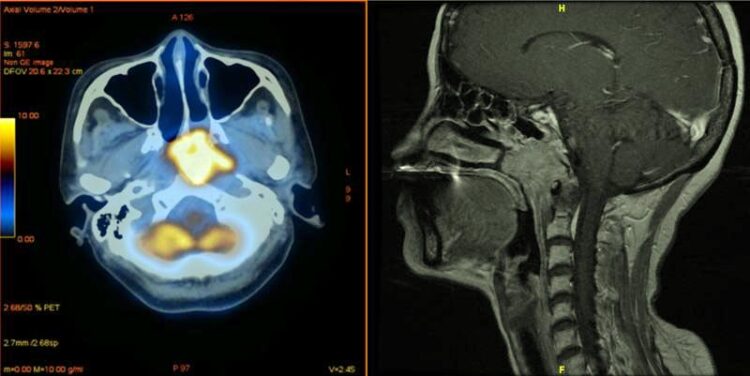Covid vaccination improves effectiveness of cancer treatment

Nasopharyngeal tumors (highlighted in yellow) are a common condition in countries in Southeast Asia. However, concerns that the therapy might interact unfavorably with Covid vaccination appear to be unfounded.
Image: Y.J. Hua / Sun Yat-sen University Cancer Center
Patients with nasopharyngeal cancer are often treated with drugs that activate their immune system against the tumor. Until now, it was feared that vaccination against Covid-19 could reduce the success of cancer treatment or cause severe side effects.
A recent study by the Universities of Bonn and Shanxi in the People’s Republic of China now gives the all-clear in this regard. According to the study, the cancer drugs actually worked better after vaccination with the Chinese vaccine SinoVac than in unvaccinated patients. The results are published as a “Letter to the editor” in the journal Annals of Oncology, but are already available online.
Many cancer cells are capable of subverting the body’s immune response. They do this by pushing a kind of button on the immune cells, the PD-1 receptor. In this way, they effectively shut down these endogenous defense forces. Drugs can be used to block PD-1 receptors. This enables the immune system to fight the tumor more effectively.
Vaccination against Covid also stimulates the immune response, involving the PD-1 receptor. “It was feared that the vaccine would not be compatible with anti-PD-1 therapy,” explains Dr. Jian Li of the Institute of Molecular Medicine and Experimental Immunology (IMMEI) at the University Hospital Bonn. “This risk is especially true for nasopharyngeal cancer, which, like the SARS Cov-2 virus, affects the upper respiratory tract.”
Together with cooperation partners from the People’s Republic of China, the bioinformatician has now investigated whether this concern is justified. More than 1,500 patients treated in 23 hospitals from all over China participated in the analysis. Such multi-center studies are considered to be particularly informative because the participants are very diverse and, moreover, the results are not distorted by regional characteristics.
Vaccinated patients responded better to cancer therapy
A subset of 373 affected individuals had been vaccinated with the Chinese Covid vaccine SinoVac. “Surprisingly, they responded significantly better to anti-PD-1 therapy than the unvaccinated patients,” explains Prof. Dr. Christian Kurts, Director of IMMEI and member of the Transdisciplinary Research Area “Life & Health” and the Cluster of Excellence ImmunoSensation. “Furthermore, they did not experience severe side effects more often.” The researchers cannot say why the treatment was more successful after vaccination. “We assume that vaccination activates certain immune cells, which then attack the tumor,” says Prof. Dr. Qi Mei of Shanxi University Hospital. “We will now investigate this hypothesis further.”
Nasopharyngeal cancer is quite rare in this country. In southern China and other countries in Southeast Asia, however, the disease is widespread. One of the suspected reasons for this is the frequent use of air conditioning in the hot and humid regions. Nutritional factors also appear to play an important role. In Taiwan, nasopharyngeal cancer is now considered one of the leading causes of death among young men.
Participating institutions and funding:
In addition to the University of Bonn and the University Hospital, Shanxi Medical University and Tongji Medical College were involved in the work. The researchers also collaborated with a number of clinics throughout China. The study was funded by the Sino-German Center for Research Promotion (SGC), the DFG Cluster of Excellence ImmunoSensation², and the German Federal Ministry of Education and Research (BMBF).
Wissenschaftliche Ansprechpartner:
Dr. Jian Li
Institute of Molecular Medicine and Experimental Immunology (IMMEI)
University Hospital Bonn
Phone +49 (0) 228/287-51050
Email: jianli@uni-bonn.de
Originalpublikation:
Hua YJ, Liu YL, Wen K, Kurts C, Wu H, Mei Q, Li J, Potentially Improved Response of COVID-19 vaccinated Nasopharyngeal Cancer Patients to Combination Therapy with Anti-PD-1 Blockade and Chemotherapy, Annals of Oncology (2022), DOI: 10.1016/j.annonc.2022.10.002
Media Contact
All latest news from the category: Health and Medicine
This subject area encompasses research and studies in the field of human medicine.
Among the wide-ranging list of topics covered here are anesthesiology, anatomy, surgery, human genetics, hygiene and environmental medicine, internal medicine, neurology, pharmacology, physiology, urology and dental medicine.
Newest articles

Largest magnetic anisotropy of a molecule measured at BESSY II
At the Berlin synchrotron radiation source BESSY II, the largest magnetic anisotropy of a single molecule ever measured experimentally has been determined. The larger this anisotropy is, the better a…

Breaking boundaries: Researchers isolate quantum coherence in classical light systems
LSU quantum researchers uncover hidden quantum behaviors within classical light, which could make quantum technologies robust. Understanding the boundary between classical and quantum physics has long been a central question…

MRI-first strategy for prostate cancer detection proves to be safe
Active monitoring is a sufficiently safe option when prostate MRI findings are negative. There are several strategies for the early detection of prostate cancer. The first step is often a…



